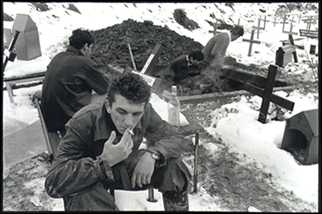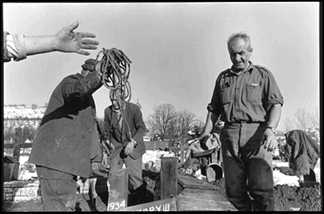|
Since December they had been doing it. But as the dreaded date of the transition
approached, the pace accelerated. When the weather permitted -- not too much snow,
not too cold -- the cemetery in Ilidza started buzzing with a feverish, dizzying,
drunken activity. They were exhuming their dead. Knowing that the land was going to
become Bosnian, that they couldn't come back, and believing that where a Serb lies
is Serbian land, they had concluded that if the land is not Serbian, the dead cannot
rest in peace.
Given that some families with the help of grave diggers may have to remove several
relatives, a process that started at 7 in the morning could last from dawn to dusk.
The fuel was slivovitz, and you were accepted only if you shared in that ritual.
Within the course of the day wallowing in snow and mud, at first horrified, maybe
disgusted, one came to see as perfectly normal what seemed at first abnormal. Imagine
a family discussing the coming transition when somebody suddenly mentions, "We should
take grandpa with us." Then the family head finds himself having to acknowledge that
he cannot take grandpa without grandma, or the uncle, or the son, or the cousin.
Finally seven coffins have to be removed from the frozen ground.
|
|

